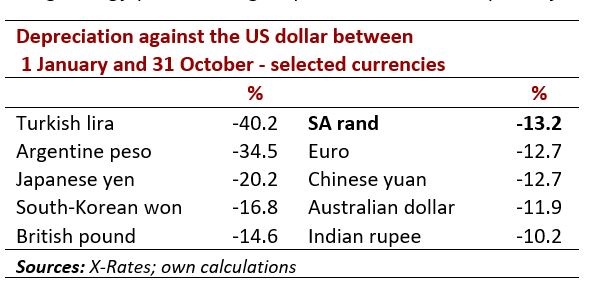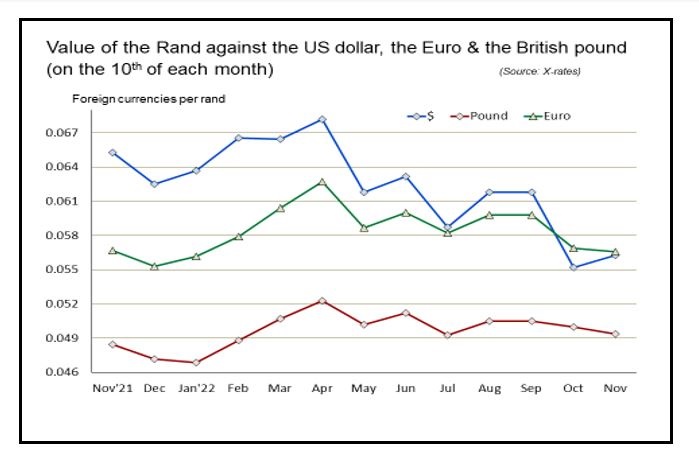
The US currently has the largest trade deficit in history and the unusually strong dollar is hurting the country’s economy in several ways, including lower earnings for multinational companies, once foreign revenues have been converted to US dollars, says Roelof Botha.
- For more financial news, go to the News24 Business front page.
The surge in the value of the US dollar since the beginning of the year may be coming to an end. Immediately after the publication of October’s inflation data for the US, the dollar index (DXY), which tracks the currency against a basket of six major trading partners, declined by more than 1.4%.
The 10-year US Treasury yield followed suit, shedding 34 basis points from its highest level in more than 20 years - 4.24%, recorded at the end of October.
Other signs of an imminent rebasing of the world’s dominant currency include the return to above parity for the euro, which had declined consistently to a record low of $0.962 against the dollar in August. After the news of the decline in the US inflation rate to 7.7% (from 8.2% in September), the euro rose to marginally above parity, representing an increase of 4.4% from August’s low.
Weakening inflationary pressures in the US seem to be convincing the world’s capital markets that a less hawkish monetary policy stance by the Federal Reserve is imminent. The extent of the slide in the dollar on 10 November is nevertheless surprising, as most analysts still expect at least another 50 basis points hike in the Federal Fund rate during the Fed’s Open Market Committee meeting in December.
Rampant US dollar
Since the beginning of the year, foreign exchange markets have been characterised by a systematic strengthening of the US dollar, despite repeated bouts of volatility.
Hardly any currency of note has been left unscathed by an enduring risk-off sentiment amongst fund managers, caused mainly by a vicious combination of record increases in global shipping charges; more attractive bond yields; lingering supply side constraints induced by the Covid-19 pandemic; rapidly rising energy prices; and geopolitical tensions, especially in Ukraine.
It is of course a fallacy to refer to the rand as weak, as the South African currency has more than held its own against two dominant currencies from an international trade perspective, namely the euro and the British pound.
A clue to a likely normalisation of currency markets crept in towards the end of October, namely speculation of smaller future increases in the US Federal Reserve Fund rate. Contrary to market expectations, the decision by the Fed to raise its benchmark interest rate by 75 basis points early in November for the fourth successive time led to a rise in US stock indices and a marginal decline in the benchmark 10-year treasury yield.
Most countries are probably hoping that the rampant rise in the dollar’s value will soon end, as it has led to higher inflation via more expensive imports. According to research by S&P Global, the 16% depreciation of the euro against the dollar in the past 12 months has added about 50 basis points to euro-zone inflation rates, whilst reducing household consumption by the same amount. Dollar strength also increases the cost of servicing any borrowing denominated in US dollars.
Impact of the trade balance
The underlying reason for the retreat of the dollar is related to a fundamental economic principle referred to as an "automatic stabiliser". In essence, this means that a strengthening currency eventually causes a country’s trade balance to deteriorate to the extent that domestic manufacturers lose market share to cheap imports.
The US currently has the largest trade deficit in history and the unusually strong dollar is hurting the country’s economy in several ways, including lower earnings for multinational companies, once foreign revenues have been converted to US dollars. This has a direct negative impact on the Federal Government’s company taxation receipts.
Russia’s currency strength during 2022 is also related to this economic law, but provides an inverse example. The ruble has bucked the trend of most other currencies, posting a gain of more than 20% against the US dollar since January. Although this seemingly defies conventional wisdom, it is clear that a combination of capital controls, high prices for energy commodities and much lower levels of imports have resulted in a record current account surplus.
Herein lies another clue to the medium-term future of the greenback. The US is bound to run into balance of payments constraints via the twin effects of pricy exports and cheap imports, which may prompt the Fed to become more patient in its attempts to lower inflation and pave the way for a more permanent return to a risk-on sentiment among fund managers fairly early in 2023.
News24 encourages freedom of speech and the expression of diverse views. The views of columnists published on News24 are therefore their own and do not necessarily represent the views of News24.




 Publications
Publications
 Partners
Partners














